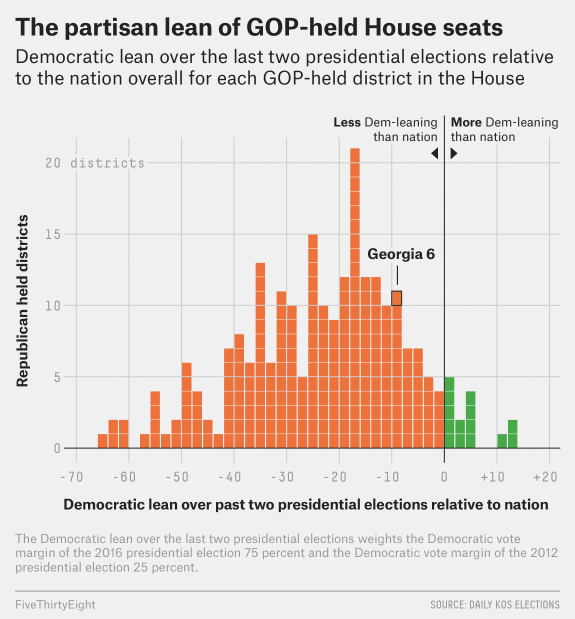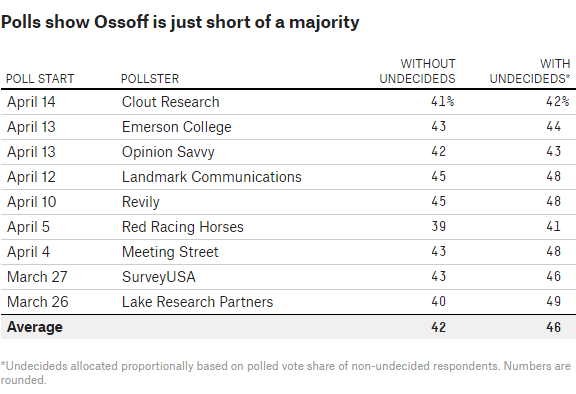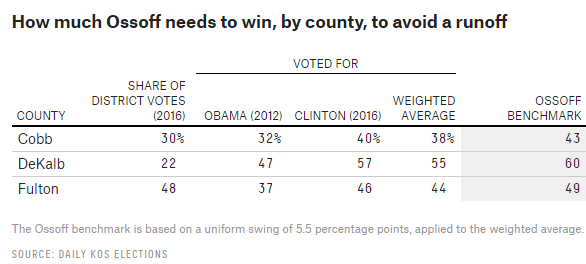Understanding why the Georgia special election is so important
Click to read the full story: Understanding why the Georgia special election is so important
By now, you’ve probably heard about the Georgia special elections which are dominating the news media today. Even Donald Trump is nervous about Democratic candidate Jon Ossoff and has been working his Twitter hard to hurt his chances.
Democrat Jon Ossoff would be a disaster in Congress. VERY weak on crime and illegal immigration, bad for jobs and wants higher taxes. Say NO
— Donald J. Trump (@realDonaldTrump) April 18, 2017
Republicans have controlled this district for forty years, but things changed with the 2016 presidential election when Donald Trump barely scraped by with just one-percent of the vote. With his approval ratings continuing to fall (even launching those 59 missiles couldn’t give Trump that much-needed bounce), this district could actually switch over.
Many Georgians who voted for Trump have been vocal that they are supporting Ossoff more as a form of protest for the way things have gone in the president’s first 100 days in office. He’s losing the patience of many hard-core supporters as he hasn’t been able to fulfill his campaign promises. Trump keeps trying to claim that he got the new Supreme Court justice through, but if it hadn’t been for Mitch McConnell, it never would have happened.

The history
Exactly how red Georgia 6 is matters, both for forecasting who will win and for interpreting what the results of the special election mean. Yes, Trump barely squeaked by Hillary Clinton there, but most other Republican candidates — presidential and House — have done much better. Tom Price, who represented the district in Congress until he resigned to become Trump’s secretary of health and human services, carried it by 23 percentage points in 2016. Mitt Romney beat Barack Obama there by the same margin in 2012. We know from past House elections that our best bet for measuring the political lean of a district is a weighted average of the last two presidential elections, with the most recent election weighted a bit more. By this weighted average, Georgia 6 is about 9.5 percentage points more Republican than the nation as a whole. (That is, if there were a tie in the national popular vote, a Republican would be expected to win Georgia 6 by 9.5 points.)

According to this measure, 47 Republican-held House seats are more Democratic-leaning than Georgia 6 is. Democrats need to pick up only 24 seats to win back the House, so even though this is the type of seat that Democrats probably want to be competitive in, taking Georgia 6 is not a necessity for taking back the House.
The candidates and rules
Today’s primary pits all candidates, regardless of party affiliation, against one another. If no one gets more than 50 percent of the vote, the top two vote-getters (again, regardless of party) will meet in a runoff on June 20. Eleven Republicans and five Democrats are running in the primary. Local Democratic officials and the liberal blogosphere quickly rallied around Jon Ossoff, a former congressional staffer. He has raised over $8 million and is expected to get almost all the Democratic votes. Republicans, on the other hand, are divided. Although former Georgia Secretary of State Karen Handel is in second place in most polls, she has averaged just 16 percent over the last nine polls (i.e., those taken within three weeks of the primary). Businessman Bob Gray and former state Sens. Judson Hill and Dan Moody — all Republicans — are not too far behind.
The polls
In the last nine polls taken, Ossoff is averaging 42 percent of the vote. And even if undecided voters are allocated proportionally among the candidates based on the percentage of the vote each has now, Ossoff only gets to 46 percent — short of a majority.

That said, special election polls (like all polls) are inexact. We collected 54 polls from special House elections that have taken place since 2004 and for each compared the leading candidate’s share in the poll with the final election results, taking into account undecideds. We found the true margin of error to be about +/- 8.5 percentage points. That’s almost double the theoretical margin of error posted for most of the polls conducted for the Georgia 6 special election. Even if we compare the average polling share that the leading candidate received in the 22 races that these 54 polls were taken in, the margin of error is still about +/- 7.5 points.
So Ossoff winning outright tonight isn’t out of the question. The average of polls is consistent with Ossoff getting between 38 percent and 54 percent. That may seem like a wide range, but polling for House races is in general less accurate than it is for higher-ballot races, and special elections, in particular, are difficult to poll because turnout is unpredictable.
The early vote
Polls show Ossoff doing about 10 to 20 percentage points better among early voters than he’ll do overall. That makes sense: Republicans are choosing between many viable candidates and therefore may need more time — perhaps until election day — to determine who they’ll cast a ballot for, while Democratic-leaning voters have long had a favorite. But that’ll make following the returns tonight a bit tricky. Don’t be fooled by early results that show Ossoff with more than 50 percent — the early vote is usually reported first. To win an outright majority and avoid a runoff, Ossoff probably wants to be well above 60 percent among early voters.
The demographics
Georgia’s 6th District is made up of parts of three counties — Cobb, DeKalb and Fulton — and those parts differ significantly from one another. The Cobb section of Georgia 6 has the largest share of white voters (at 76 percent) and is the most Republican; Trump carried that part of Cobb by 15 points. The DeKalb section of Georgia 6 has the largest share of black voters (at 16 percent) and is the most Democratic; Clinton won it by 19 points. Fulton provided about half the district’s vote in the 2016 presidential election, and the registered voters in the Fulton portion of Georgia 6 are 64 percent white and 12 percent black. Trump won the 6th District’s section of Fulton by 3 points.
The benchmarks
If you want a sense of how Ossoff is doing as the returns come in tonight, you can use past presidential results as a rough benchmark. If he’s beating the vote share for each county that is shown in the last column of the table below, Ossoff should be on track to win a majority (and avoid a runoff):

To estimate those numbers, we return to the weighted average vote share that Democratic presidential candidates have received over the last two cycles — 44.5 percent of the district-wide vote.3 To get to 50 percent and avoid a runoff. Therefore, Ossoff would need to bring in an additional 5.5 percentage points districtwide. The table above simply adds those points to the weighted average in each county in the district. For example, in the DeKalb portion of the district, the weighted average of Clinton’s and Obama’s vote shares is about 55 percent; when a uniform swing of 5.5 points is applied, we find that Ossoff would need upwards of 60 percent there.
If the county-level isn’t small enough for you, we’ve also calculated what share Ossoff might need to win a majority by voting precinct. County benchmarks can be helpful, but county-level returns can be misleading depending on which precincts have reported and which haven’t. You can track the precinct benchmarks here. This way, you’ll be able to tell if the returns you are seeing in Fulton are from a heavily Republican precinct like Roswell precinct 9 (RW09) or a heavily Democratic one like Sandy Springs precinct 15A (SS15A).
What’s next?
If there’s no outright winner at the end of this first round of voting and Ossoff moves on to face a Republican in the runoff, be careful about using tonight’s results to forecast Round 2. The dynamics in the runoff will be completely different; whichever Republican comes in second, for example, will be able to turn their fire on Ossoff instead of fighting other Republicans. As my colleague Nate Silver wrote on Monday:
Even if Ossoff finishes in the low 40s, it will be hard to rule him out in the second round provided that he still finishes in first place by a comfortable margin. But even if Ossoff finishes just a point or two shy of 50 percent, and Democrats finish with more votes than Republicans overall, he won’t have any guarantees in the runoff …
Polling and history both suggest that Ossoff would likely be about a 50-50 bet in Round 2.
The post Understanding why the Georgia special election is so important appeared first on Movie TV Tech Geeks News By: MTTG Staff
